|
Task* : Research Essay Using a variety of sources.
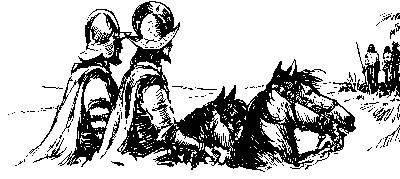
Essay question:
Why
did the Spanish Conquistador Hernando Cortez invade the Aztec Indian
lands, and what effects did this invasion have on the Aztec
people’s civilisation?
|
|
SOURCES
TO USE:
- Use
sources from the following collection of Secondary and Primary
Sources in writing your essay.
- Use
this
link to see a page of coloured pictures and maps. You could
also use the primary pictorial sources on this page in your
essay.
PLANNING THE ESSAY: You could use this
link for advice on planning the essay.
HOW TO STRUCTURE THE ESSAY: You could use this
link for advice on how to structure the essay.
(Task* from http://www.interactive-learning.com.au
)
|
|
Part
A. SECONDARY SOURCES
|
|
SOURCE
1
Cortez was a young Spaniard
who went to
Cuba
to find his fortune. He heard stories of gold in
Mexico
and
South America
. In 1519 Cortez left
Cuba
to find this gold. With 300 Aztecs to every one of Cortez's
men the Spanish fought. After 3 battles the Indians gave up. They
could not complete against the guns and horses. The Spaniards also
wore metal armor. More than this the Indians were afraid of the
"god-like" warriors. On November 8, 1519 Cortez reached
Mexico City
and was received by Montezuma, the Aztec emperor. Cortez captured
Montezuma and began to rule the empire through him. The Spaniards
made the Aztecs work in the mines looking for gold and silver. This
gold and silver was shipped back to
Spain
.
From http://www.mce.k12tn.net/explorers/spanishexplorers.htm
|
|
SOURCE
2
1520--The Aztecs & Cortes . Hernando Cortez landed
in Vera Cruz,
Mexico
in 1520. He burned his boats upon arrival; he was there to
stay. Cortez and his troops explored into the interior of
Mexico
and soon came to the the Aztec capital of
Tenochtitlan
. The Aztec empire was ruled by Montezuma. The
city was a gorgeous metropolitan center - it had a population of
250,000 at this time and was beautified with floating gardens and
canals, along with a prolific amount of gold. The Aztecs made
a daily sacrifice of a human heart to keep the sun from falling out
of the sky.
Cortez
immediately wanted the Aztec gold. He told Montezuma that the
Spaniards, "have a strange disease of the heart, for which gold
is the only cure."
When the gold was not
forthcoming, Cortez began a war. He broke the Aztecs with a
combination of superior weapons and allying himself with enemies of
the Aztecs, and inadvertently decimating the population with
disease.
From http://66.188.129.72:5980/History/AmericanIndian/euro_conquistadors.htm
|
|
SOURCE
3
“The
long-term effects of the Conquest are no less fascinating. The
'Columbian Exchange' as modern historians call it, brought the
potato, the pineapple, the turkey, dahlias, sunflowers, magnolias,
maize, chillies and chocolate across the
Atlantic
. On the other hand, tens of millions died in the pandemics of the
16th century, victims of smallpox, measles and the other diseases
brought by Europeans (and don't forget that the African slave trade
was begun by the Europeans, to replace the work force they had
decimated).”
From The Story of the Conquistadors
By Michael Wood
(http://www.bbc.co.uk/history/discovery/exploration/conquistadors_02.shtml
)
|
|
SOURCE
4
Even with their Indian
allies the Conquistadors never numbered more that 25,000
armed men in their initial move toward the Aztec Capital.
Approximately 500 Spaniards with only 16 horses, plus their Indian
Allies, engaged armies that outnumbered them at least ten to one.
What is most remarkable is
that the Aztec account of the Conquest, is almost completely
non-judgmental. Although they describe Spanish atrocities in gory
detail, it is done factually, with little emotion. Additionally,
they give Cortes credit for negotiating peace and joining forces
with the various tribes, that were the enemies of the Aztecs that he
met on his way to
Tenochtitlan
, the Aztec Capital.
When
the Aztecs originally came to this area now called
Mexico
they raised their own war god, the blood-thirsty Huitzilopochtli, to
an exalted status. They abandoned the more benevolent gods of the
Toltecs, who had not required human sacrifice. Identified with the
Sun, their "giver of life," their fear that it would not
return, led to the daily ripping out of human hearts, to placate
him.
At the beginning of the Spanish invasion the Spaniards were mistaken
for a returning God and these doubts lingered long enough to enable
the Conquistadors to gain a foothold and enlist allies before
being attacked in force by the Aztec armies.
This belief that
Huitzilopochtli demanded a steady stream of blood led to constant
warfare, since they believed he preferred the blood of a brave
warrior, captured in battle. Soon, human sacrifice to the rest of
their gods became the rule. Thus, the Aztec concept of war after
their empire was established was not the total defeat of an enemy,
but rather a short skirmish to capture warriors to sacrifice to
their Gods. Much of it was ceremonial, with well-established rules
that minimized bloodshed. For example they constantly raided the
Tlaxcalans, their bravest foe, never seeking to conquer them, but
preserving them as a source for sacrificial material. This constant
culling of Tlaxcalan warriors to be sacrificed, led to the alliance
between Cortes and the Tlaxcalans.
Both
the Cempoalans and the Tlaxcalans tribes, from whom the
the Aztecs obtained victims, became willing allies of the
Spaniards. The
Aztec perception of them as valiant warriors was correct. Without
them as allies, it is very unlikely that the Spaniards could have
succeeded. Additionally, the Aztec tactics of quick raids, seizing
prisoners, and then withdrawing, left them unprepared to fight an
enemy like the Conquistadors. Also, human sacrifice had led
to cannibalism based on the theory that eating the body of a brave
warrior would increase their own prowess in battle. This above all
else incited the Spaniards to use violence to destroy the Aztec
religion.”
Spanish priests had
preserved numerous original Aztec documents by devising a way to
write the Nahuatal language of the Aztecs in the Latin alphabet.
Original words, written or dictated by Aztecs, still survive. This
enabled eyewitnesses to the Conquest to record an Aztec account of
the entire invasion.
Both the Spaniards who first encountered them and latter historians,
describe the Aztecs as highly skilled craftsmen, with a well
organized system of government. They had a written as well as an
oral language, compulsory education, even a health care system.
According to Bernal Diaz, himself a Conquistador, at their first
glimpses of
Tenochtitlan
, the Spaniards were awe struck. They saw a city with canals,
bridges, a fresh water supply, floating markets, towering
Temples
and large paved plazas. Estimates of its population vary between
300,000 and 500,000 people. Few cities in
Europe
were as large or as clean. Despite this, the Spaniards still
considered them barbarians, largely because human sacrifice and
aspects of cannibalism were part of the Aztec religion. William
Prescott persists in this, always referring to the Aztecs as
barbarians …All historians recognize that in addition to seeking
gold and new territory for Spain, the Conquistadors were strongly
committed to spreading Christianity.
From
The
Aztecs Speak An Aztec account of the Conquest of Mexico
By S.
Lenchek
(http://www.mexconnect.com/mex_/travel/slenchek/slaztec4.html)
|
|
SOURCE
5
Hernán Cortés (also
spelled Cortez), was a Spanish adventurer and conquistador (he was
also a failed law student) who overthrew the Aztec empire and
claimed
Mexico
for
Spain
(1519-21).
Cortes
sailed with 11 ships from
Cuba
to the
Yucatan
Peninsula
to look for gold, silver, and other treasures. Hearing rumors of
great riches, Cortés traveled inland and "discovered"
Tenochtitlan
, the capital of the Aztec empire. He then brutally killed the Aztec
emperor Montezuma and conquered his Aztec Empire of Mexico, claiming
all of
Mexico
for
Spain
in 1521. Treasures from the Aztecs were brought to
Spain
, and Cortés was a hero in his homeland. Cortés was appointed
governor of the colony of
New Spain
, but eventually fell out of favor with the royals. He then returned
to
Spain
where he died a few years later.
From Explorers and Conquistadors of
Mexico
(http://www.enchantedlearning.com/explorers/mexico.shtml)
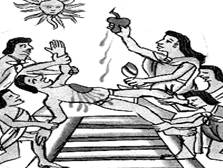 Aztec
Drawing Aztec
Drawing
|
SOURCE
6
The priests that came to the
New World were faced with the enormous job of converting the millions of
indians who were at that time worshiping various pagan deities.
The priests used several strategies for conversion. Many
conversions were forced with the help of Spanish soldiers.
Accompanying the conquistadors during the initial conquest was
a priest that would read a ‘requirimiento’
(a warning letter of demand) to the indians in Latin or
Spanish and after this formality, the Spaniards were allowed to
pillage and plunder. The ‘requirimiento’ was the only
warning the natives had although they could not understand the
language and sometimes it was not read in their presence! The
document stated that the indians would have to surrender
unconditionally or face enslavement:
|
|
Excerpts
from a Requirimiento (Spanish ‘warning’ letter.)
|
|
|
"...we will not
compel you to become Christians, unless after being so
informed regarding the truth, you desire to be converted to
our faith..."
|
|
|
"But ...if you do
not do this...I will come among you powerfully and make war
upon you everywhere and in every way that I can"
|
|
|
"I will take your
persons, your women and children, and will make slaves of them
and sell them or dispose of them as their Highness shall
command"
|
|
|
"...the damage and
death which you suffer thereby shall be your own fault and not
the fault of their Majesties, nor of mine, nor the knights who
accompany me”
|
|
|
The priests that accompanied the waves of conquistadors to the
New World
were an elite group who through Pope Leo X were given the divine
power of the Pope with "full authority...in matters relating to
the conversion of the Indians."
These priests got rich from the donations of the hacendados (large
land owners) who used the encomenderos system which forced the
Indians into a form of slavery. The encomienda was the primary
system of Indian debt servitude the Spanish established in the
New World
(The Americas). The indian was forced to work for a land owner
or in a mine in this system as payment for being given Christianity
and land to live on. … Millions of Indians died in the
encomiendas, working off their christianity.
The whole of the
population of the
island
of
Hispanola
was wiped out under this system of labor. Conditions under the
encomienda were atrocious, they were worked 20 hours a day with
very little food and in constant exposure to European diseases.
All Indians were burdened by excessive ecclesiastical fees as well
as clerical exploitation's. Many priests also had encomiendas
were they could exploit the Indian labour. Concubinage was
very common among the priests of the later period excluding only the
Jesuits.”
From
The Christianization of the Americas by
Jennifer
Stephens and Joseph Carter
http://www.utexas.edu/courses/wilson/ant304/projects/projects98/carterp/carterp.html
|
|
Part
B. PRIMARY SOURCES
|
|
SOURCE 7
When some merchant friends of his heard that he had been made
captain-general they lent him 4,000 pesos in coin, and another 4,000
in goods on the security of the Indians and land he owned. He then
had two standards and banners made. They were worked in gold with
the royal arms and a cross on each side and a legend that read:
"Brothers and comrades, let us follow the sign of the
Holy Cross in true faith, for under this
sign we shall conquer."
And he ordered a proclamation to be made to the sound of trumpets
and drums, in the name of His Majesty and of himself as his
captain-general, that anyone who wished to accompany him to the
newly discovered lands, to conquer and settle, would receive a share
of the gold, silver, and riches to be gained, and Indian slaves,
once the country had been converted.
A description of Cortez by
Bernal Diaz ,1516
.
|
|
SOURCE
8
From letters written in
Mexico
we have learned that Father Bernardino de Sahagun has composed a
history of the most noteworthy things in
New Spain
. It is a large collection of all the rites, ceremonies, and
idolatries practiced by the Indians when they were unbelievers of
Christianity, divided into 12 volumes. Although it is understood
that the zeal of Father Bernardino has been noteworthy, and that his
intention was for the book to bear wholesome fruit, it seems that it
is not proper that this book be published for several reasons.
We thus command that, upon receiving this notice, you obtain these
books with great care, and that you make sure that no original or
copy of them is left there, and that you have them sent in good
hands at the first opportunity to the Spanish authorities in order
that they may be examined,. And you are warned absolutely not to
allow any person to write concerning the superstitions and ways of
life of these Indians in any language.
Royal Decree of Charles I of
Spain
.
|
|
SOURCE 9
All the wars called conquests were and are most unjust and truly
tyrannical. We have taken over all the kingdoms of New Spain.Our
king, with all the power God gave him, cannot justify the wars and
robberies against the Indians.
.
All the gold and silver, pearls and other riches, brought to Spain
and traded among Spaniards in the New World--all is stolen, save
perhaps a very little that came from the islands and places we have
already depopulated.
Those who stole it and today steal it by conquests cannot be saved
unless they restore it.
.
The natives in any or all the areas we have invaded in the New World
have acquired the right to make just war upon us and erase us from
the face of the earth, and this right will last until the Day of
Judgment.By all reasoning, the Indians--who never harmed nor were
subject to Christians--freely possess and rule their own lands, and
no one can make just war upon them.
.
From the beginning until now,
Spain
's entire invasion of the
New World
has been wrong and tyrannical. And from 1510 on, no Spaniard there
can claim good faith as an excuse for wars, discoveries, or the
slave trade.
By Bartolomeo de las Casas
|
|
SOURCE 10
God
so loved the human race that He created man that he might
participate, not only in the good that other creatures enjoy, but
also in the capacity to seek the Supreme Good and behold it face to
face. And since man, according to the testimony of the Sacred
Scriptures, has been created to enjoy eternal life and happiness,
which none may obtain save through faith in our Lord Jesus Christ,
it is necessary that he should possess the nature which allows him
to receive that faith. For in the office "Go ye, and teach all
nations," He said all, without exception; for all are capable
of receiving the doctrines of the faith. ….
We
define and declare that the said Indians and other peoples should be
converted to the faith of Jesus Christ by preaching the word of God
and by the example of good and holy living.
Papal Decree 1537
|
|
SOURCE 11
Each Indian is to be given a house of
his own for his family and a farm for cultivation and cattle
raising. The Indians are to be persuaded to go about dressed like
"reasonable" men. The Indians are to be persuaded to
abandon their ancient evil ways, and they are not to bathe as
frequently as before, as we are informed that it does them much
harm.
Royal Decree 1501 Ferdinand
and Isabella
|
|
SOURCE
12
Informed of the arrival of Cortez and his victories and his
intention to go to
Mexico
under the supposed reason of a conference, Montezuma sought all
possible means to keep him from his plan. Failing in this,
terrorized and filled with fear, he received him in the city with
about 300 Spaniards.
Cortez for his part, after taking possession of the city, forced the
king and his subjects through terror to receive the yoke and rule of
the King of Spain, but also imprisoned King Montezuma himself
because of his suspicion that a plot was on foot to kill some
Spaniards. This he could do because of the stupidity of the people.
And thus Cortez, though aided by so small a number of Spaniards and
so few natives, was able to hold them, oppressed and fearful at the
beginning, for many days. Could there be a better or clearer
testimony of the superiority that some men have over others in
talent, skill, strength of spirit, and virtue? Is it not proof that
the Indians are slaves by nature?
I
have made reference to the customs and character of the barbarians.
What shall I say now of the unholy religion and wicked sacrifices of
such people, who believed that the best sacrifices to offer were
hair and human hearts?
Juan de Sepulveda argues
about the treatment of the Aztecs
|
|
SOURCE 13
This
great city contains many mosques, or houses for idols, very
beautiful buildings situated in the different precincts. I
overturned the idols in which these people believed the most and
rolled them down the stairs. Then I had those places cleaned, for
they were full of blood from the sacrifices. And I set up Christian
images in them. This disturbed Montezuma and the natives a good
deal. And they told me not to do it. They said that if it became
known, the people would rise against me, as they believed that these
idols gave them all their goods. If the people allowed them to be
ill-treated, they would be angered and give nothing, and would take
away the fruits of the soil and cause the people to die of want.
The
figures of the idols exceed in size the body of a large man. They
are made of all the seeds and vegetables which they eat, ground up
and mixed with one another, and kept together with the heart's blood
of human beings. When the statues are finished, the priests offer
them more hearts, which have also been sacrificed, and smear the
faces with the blood. The idols are dedicated to different things.
To obtain favors in war these people have one idol, for harvests
another, and for everything they desire they have special idols whom
they honor and serve.
Cortez describes his
treatment of the Aztecs
|
|
SOURCE
14
We are engaging in a just and good war
which will bring us fame. Almighty God, in whose name and faith it
will be waged will give us victory. Here I offer you great rewards,
although they will be wrapped about with great hardships. And if you
do not abandon me, as I shall not abandon you. I shall make you in a
very short time the richest of all men who have crossed the seas,
and of all the armies that have here made war.
You are few, I see, but such is your spirit that no effort or force
of Indians will prevail against you. For we have seen by experience
how God has favored the Spanish nation in the
Americas
, and how we have never lacked courage or strength, and never shall.
A Speech made by Cortez to
his men recalled years later by Cortez in a conversation
Documents from http://www.thecaveonline.com/APEH/conquistadorsdbq.html
|
|
SOURCE
15
The
Spanish Conquistadors
: Gold, Glory, And GOD
Unknown to the Indians of Florida, their destiny was being
determined by political and economic forces taking place across the
Atlantic Ocean in Europe. At the end of the fifteenth century,
thousands of daring adventurers would be crossing the ocean to
 conquer within a few centuries what had taken the Indians thousands
to years to inhabit.
conquer within a few centuries what had taken the Indians thousands
to years to inhabit.
The conquistadors of
Spain
who ventured into the lands of the Indians were motivated by many
forces. The discovery of gold in
Mexico
and
Peru
caused thousands of impoverished Spanish peasants to join the
military. Under the rules of primogeniture, younger sons of the
nobility would not inherit much of the family estate, but leading a
successful colonial mission could give you the funds to build a
castle.
Others sought glory and fame, now
that the wars with the Moors were over. Only in the
New World
was there the opportunity for quick advancement in the Spanish
military and diplomatic careers.
Finally,
there were those who came for spiritual reasons. They were more than
just the priests and church leaders. Catholic Spain had a strong
missionary zeal, for they had engaged the Muslim infidels for four
centuries. The eternal blessing of
God would be earned by converting the
Americas
into Catholic lands.
From http://.www.2000orlando-florida.com/
Orlando/spanishco...
|
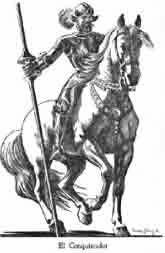 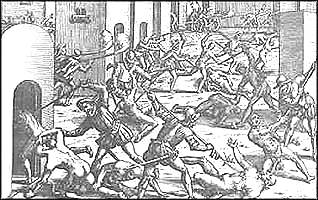 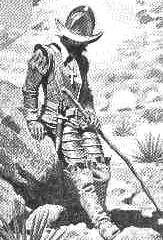
|
|




